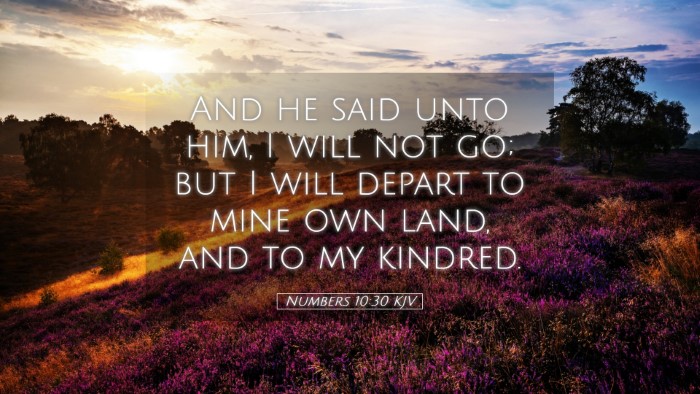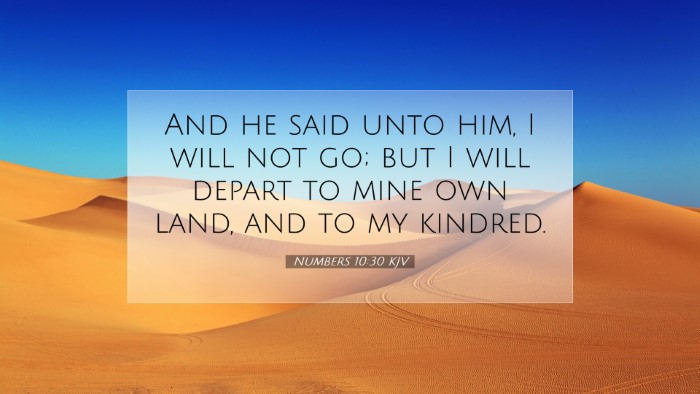Commentary on Numbers 10:30
Bible Verse: "And he said unto him, I will not go; but I will depart to mine own land, and to my kindred."
Introduction
The verse presents an exchange between Moses and Hobab, the son of Raguel, regarding his potential role in guiding the Israelites through the wilderness. This passage encapsulates themes of kinship, decision-making, and divine guidance. Here, we explore the rich theological implications of this interaction informed by respected public domain commentaries.
Contextual Background
This verse appears in the broader narrative of the Israelites’ journey from Egypt to Canaan. Hobab is introduced as a Midianite, potentially a relation by marriage through Moses' wife, Zipporah. His expertise as a guide is recognized, but his resistance raises questions of loyalty and calling.
Historical Setting
- The Israelites are on the brink of entering their promised inheritance.
- Hobab's refusal to accompany them underscores a personal choice amid communal mission.
Commentary Insights
Matthew Henry’s Commentary
Henry emphasizes the evident tension in Hobab’s response. He notes that Hobab, despite having a valuable skill set as a guide, chooses personal ties over the collective journey of faith. Henry interprets this as a reminder for believers to consider their spiritual commitments against personal inclinations.
Henry further reflects on the significance of Hobab’s potential adherence to the Israelites’ covenantal journey, suggesting that choosing familial duty over divine duty can lead to spiritual consequences. He advises pastors and theologians to contemplate the prioritization of God’s calling in the life of every believer.
Albert Barnes’ Notes on the Bible
Barnes delves into the implications of Hobab’s role. He posits that Hobab knew the wilderness' paths and was invaluable for leading the Israelites through uncharted territories. His choice to return home illustrates the struggle many face when personal desires conflict with divine missions.
Moreover, Barnes addresses the notion that God may provide guidance through unlikely sources. Therefore, even though Hobab declines, Barnes encourages readers to remain open to unexpected sources of wisdom and direction that can aid in one’s spiritual journey.
Adam Clarke’s Commentary
Clarke comments on the cultural expectations surrounding kinship and obligations. He explores the implications of Hobab’s attachment to his land and people, asserting that such attachments can often cloud one’s judgment regarding God’s higher purposes.
Clarke also raises an important theological point: that God’s people should aspire to prioritize His calling above all earthly relationships or attachments. He calls upon pastors to encourage congregational members to discern their spiritual vocations in light of God’s overarching plan for humanity.
Theological Reflections
This interaction underscores a critical theological reflection on divine guidance versus personal autonomy. Numbers 10:30 challenges believers to navigate their roles in God’s mission while grappling with familial duties and personal agency.
Divine Guidance versus Personal Autonomy
Both Henry and Barnes highlight the tension between choosing personal comfort and responding to God's call. This brings a vital question for students and scholars of theology: How do one’s personal desires align or conflict with God’s will? The passage encourages deep self-reflection on one's spiritual journey.
Practical Application for Ministry
Pastors and ministry leaders can draw profound lessons from this passage—a reminder that the journey of faith often involves guiding others while facing decisions that impact communal direction. The necessity to assist congregants in recognizing their purpose in God's work remains paramount.
By fostering deep discussions around commitment to God's calling, the church can better equip believers to navigate the complexities of faith in relation to personal ties. This call to equip others mirrors Hobab's instructive potential, emphasizing the need for preparation in both heart and mind for the Christian journey ahead.
Conclusion
Numbers 10:30 serves as a poignant reminder of the choices faced in our spiritual journeys. The refusal of Hobab is an invitation for reflection on how we balance our gifts, kinship, and God’s calling. Through the insights of Henry, Barnes, and Clarke, a deeper understanding emerges that challenges believers to engage with their spiritual destinies, recognizing the importance of guidance—both human and divine.
Final Thoughts: As such, this commentary encourages pastors, theologians, and students to grapple with the truths within this passage, promoting a robust dialogue on obedience, kinship, and the quest for divine alignment in one’s life.


